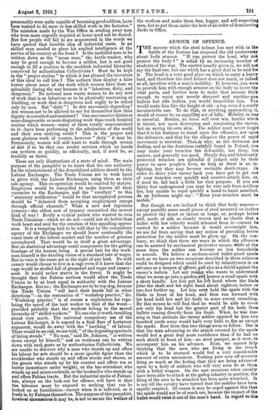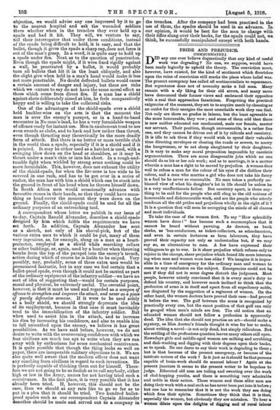ARMOUR OF OFFENCE. T HE success which the steel helmet has
met with in the battle of the Somme has reopened the old controversy about body armour. " If you protect the head, why not protect the body ? " is asked by an increasing number ei students of the war. The anstrer-usually given is, we will not say the final one, but one which has a great deal to be said for it. The head is a very good place on which to carry a heavy load, and therefore the steel helmet does not much, or indeed at all, interfere with a man's mobility. If, however, you were to provide him with enough armour on the body to cover the vital parts, and further were to make that armour thick enough to resist not merely shrapnel and machine-gun bullets but rifle bullets, you would immobilize him. You would make him like the knight of old—a log, even if a nearly invulnerable one. To do that, or anything approaching it, would of course be an appalling act of folly. Mobility in war is essential. Besides, no force will ever win battles which is intent, not upon destroying and conquering the enemy, but on saving its own skin. Tho soldier must never forget that it is his business to stand upon the offensive, not upon the defensive, and that for the offensive the power of rapid movement is essential. That.is. w.hy, as the Germans are finding, and as the Austrians ceffsblY found in Poland, you may make your trenches top defensible, too deep, too narrow, and generally too good. Deeply dug and laboriously protected trenches are splendid if judged only by their power to save people's lives, so long as there is no in- fighting, but they may become veritable death-traps. In order to drive your enemy back you have got to get out of your trenches very quickly and counter-attack him, or, if need be, fall back a little for that purpose. If you are thirty feet underground you may be very safe from artillery fire, but unable to repel quickly a hand-to-hand assailant. As an Irishman might say : " Even your trenches must be mobile."
But though we are inclined to think that body armour— except possibly some small pieces of steel mounted on leather to protect the heart or throat or lungs, or, perhaps better still, made of silk so closely woven and so elastic that a bullet with low velocity would rebound from it—cannot be carried by a soldier because it would overweight him, we are far from saying that any notion of providing better protection for the soldier must be given up. On the con- trary, we think that there are ways in which the offensive can be assisted by mechanical protective means, while at the same time the soldier can become no loss formidable in assault. We believe a medium-sized bullet-proof spade such as we have on two occasions described in these columns could be designed which could be used by infantrymen in an advance as a weapon of offence, ond also as a shield against the enemy's bullets. Let any read= *ho wants to understand what we mean go into a garden/cud lorrow a small spade with a short handle. Let him put his left hand where the blade joins the shaft and his right hand -about eighteen inches or two feet further up. Let him next hold the spade with the blade in front of his head, and then run forward with his head held low and his body to some extent crouching. By this means he will find that he would be able to cover not only his head but the greater part of his body from bullets coming directly from his front. When ho was run- ning in that attitude the enemy soldier opposed to him two hundred yards away would have very little to fire at except the spade. Now from this two things seem to follow. One is that the man advancing to the attack covered by the spade would feel a great deal more confidence than if he had no such shield in front of him—no steel parapet, as it were, to accompany him on his advance. Next, we cannot help thinking that the men who are living in the trench which is to be stormed would feel a very considerable amount of extra uneasiness. Nothing puts men off accurate firing so much as the feeling that they are being advanced upon by a body of soldiers who will very soon be at them with a lethal weapon. On the rare occasions when cavalry have been able to attack at the gallop infantry in position, the firing of the men to be attacked has been quite wretched. It is not till the cavalry have turned that the saddles have been rapidly emptied. Of course it may be urged against this that the spade would not be of much use, because the impact of the bullet would twist it out of the man's hand. In regard to this objection, we would advise any one impressed by it to go to the nearest hospital and ask the wounded soldiers there whether when in the trenches they ever held up a spade and had it hit. They will, we venture to say, tell their interrogator that under these conditions, instead of the spade being difficult to hold, it is easy, and that the bullet, though it gives the spade a sharp rap, does not force it out of the man's grasp. In a word, it is quite easy to hold up a spade under fire. Next as to the question of penetration. Even though the spade might, if it were fixed rigidly against a wall, be penetrated by a bullet, it would probably turn all bullets that hit it in the least obliquely, and also the slight give when held in a man's hand would make it less not more penetrable. No doubt deflected bullets would cause a certain amount of danger and injury, but these are risks which we ienture to say do not have the same moral effect as those which come from direct fire. If a man has a shield against shots deliberately aimed at him, he feels comparatively happy and is willing to take the collateral risks.
One of the advantages of the shield-spade over a shield held buckler-wise on the arm is that the moment the man is over the enemy's parapet, or in a hand-to-hand encounter in No-man's-land, he has a very formidable weapon of offence ready for instant use. Men in excitement tend to use even swords as clubs, and to hack and hew rather than thrust, even though thrusting may theoretically be the more deadly form of attack. But there is no better or more terrible club in the world than a spade, especially if it is a shield and if it is pointed. It may be either used as a hatchet is used, with a swinging blow down on the head or shoulders, or it may be thrust under a man's chin or into his chest. In a rough-and- tumble fight when wielded by strong arms nothing could be more formidable. This, however, does not exhaust the utility of the shield-spade, for when the fire-zone is too wide to be covered in one rush, and has to be got over in a series of rushes, the man has with him a shield which can be stuck into the ground in front of his head when he throws himself down. In South Africa men would occasionally advance with favouPite stones in their hands, so that they could have some- thing as head-cover the moment they were down on the ground. Finally, the shield-spade could be used for all the ordinary purposes of an entrenching tool.
A correspondent whose letter we publish in our issue of to-day, Captain Ranald Alexander, describes a shield-spade designed by him which fulfils the requirements we have set forth. In addition, Captain Alexander has sent us a sketch, not only of his shovel-pick, but of the various extra uses to which it could be put, many of them very ingenious, as, for example, slung on a man as a heart- protector, employed as a shield while searching cellars or other buildings, or, again, used by a bomber when throwing bombs from the top of the parapet into the enemy's trench, action during which of course he is liable to be sniped. Very possibly, nay, probably, some of these extra uses would be pronounced fantastic, but in any case we feel certain that a bullet-proof spade, even though it could not be carried as part of the ordinary equipment of the infantry soldier—we have no sort of idea of suggesting that—would for certain purposes, moral and physical, be extremely useful. The essential point, however, is that it must be used and regarded as a weapon of offence to strengthen and improve the attack, and never as a piece of purely defensive armour. If it were to be used solely as a body shield, we should strongly deprecate the idea of its employment, because in that case it must inevitably tend to the immobilization of the infantry soldier. But when used to assist him in the attack, and to increase his élan by increasing his confidence, and also to enable him to fall unscathed upon the enemy, we believe it has great possibilities. As we have said before, however, we do not desire to write with the overweening confidence with which we fear civilians are much too apt to write when they are run away with by enthusiasm for some mechanical contrivance. It is quite possible that though the thing looks so well on paper, there are insuperable military objections to it. We are also quite well aware that the modern officer does not want any coaching from civilians in regard to such inventions. He is perfectly capable of thinking them out for himself. There- fore we arc not going to be so foolish as to call anybody, either high or low in the Army, names for not having tried such a contrivance. In the first place, it is very possible that it has already been tried. If, however, this should not be the case, then we should at any rate like to go so far as to put in a plea that it should be tried. Two hundred bullet- proof spades such as our correspondent Captain Alexander describes should be made and served out to a company in the trenches. After the company had been practised in the use of them, the spades should be used in an advance. In our opinion, it would be best for the men to charge with their rifles slung over their backs, for the spade could not, we think, be successfully manipulated except with both hands.































 Previous page
Previous page